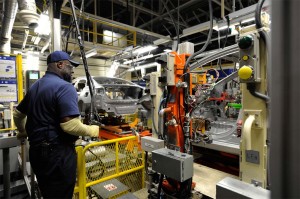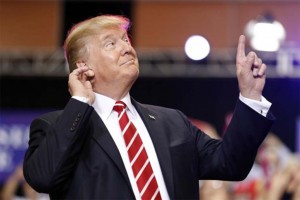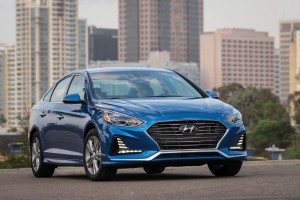
Hyundai's plant in Montgomery, Alabama, could be impacted severely by a 25% tariff on imported vehicles by the Trump administration.
Up until now, China, Mexico, Canada and Germany have all been at the heart of unfolding controversy about trade and tariffs.
But a new report also suggests that tariffs could destabilize manufacturing base that the South Korean auto giant, Hyundai, has developed in Alabama.
The South Korean labor union at Hyundai Motors has warned that the 25% tariff on autos being imported into the United States being considered by the Trump administration could jeopardize as many as 20,000 jobs in Alabama.
The South Korean union said in a statement that U.S.-based jobs would be the most vulnerable due to a labor agreement that requires the South Korean automaker to close any foreign plants before cutting production at home.
(Every car sold in the U.S. is an “import.” Click Here for the story.)
The labor union warned that a decline in U.S. auto imports connected to the Trump’s proposed tariffs could force Hyundai to examine the extent of its operations at its Alabama-based manufacturing plant.
“If South Korean car exports to the U.S. get blocked and hurt sales, the U.S. factory in Alabama that went into operation in May 2005 could be the first one to be shut down, putting some 20,000 American workers at risk of layoffs,” the statement from the Hyundai labor union reads.
Kia, Hyundai’s South Korean partner where workers are represented by the same union, also operates a manufacturing plant just over the Alabama state line in Georgia.
The South Korean metalworkers union has earned a reputation for militancy and over the years has had an antagonistic relationship with Hyundai’s management, which makes it unlikely the automaker could sidestep the provision without a major work stoppage.
Earlier this year, Hyundai did announce new investment in its manufacturing complex in Alabama.
(Click Here to see how “nearly every segment of auto industry” is threatened by Trump trade tactics.)
“With our latest expansion, HMMA continues to show its strong commitment to the people of Montgomery and the people of Alabama,” Hyundai President and CEO Dong Ryeol Choi said of the plant less than two months ago.

President Donald Trump and his proposed 25% tariff on foreign-built vehicles could have significant ramifications at home.
“Hyundai is continuing its track record of investing in new manufacturing technologies to ensure the long-term success of our Alabama assembly plant.”
The Department of Commerce is investigating whether auto imports pose a great enough security threat to impose these tariffs. The Trump administration’s proposed tariffs have been opposed by many, including the Association of Global Automakers which represents Toyota, Volkswagen, BMW and Hyundai.
BMW operations in South Carolina and Mercedes-Benz operations in Alabama are already facing potential cutbacks because they use their plants in the United States to build and export utility vehicles to China. Earlier this month, China has imposed steep tariffs on vehicles made in the U.S. in response to new tariffs imposed by the U.S. on goods made in China.
The U.S. Senate, in a rare display of bi-partisanship, went on record this week with a non-binding resolution, stating the Trump administration was overstepping its authority under a section of federal law that allows the President to impose tariffs on goods that pose a threat to U.S. national security. The Trump administration has proposed using the national security provision to impose tariffs on vehicles imported into the United States.
(To see more about how Trump’s potential auto tariffs are getting a global pushback, Click Here.)
Since late June, Trump has been pre-occupied recently with the selection of a new justice for the U.S. Supreme Court and preparations for a long European trip that will culminate in a meeting Monday with President Vladimir Putin.


“labor agreement that requires the South Korean automaker to close any foreign plants before cutting production at home”
Maybe the UAW needs a similar agreement?
I didn’t know you were a strong union fan, Dick!